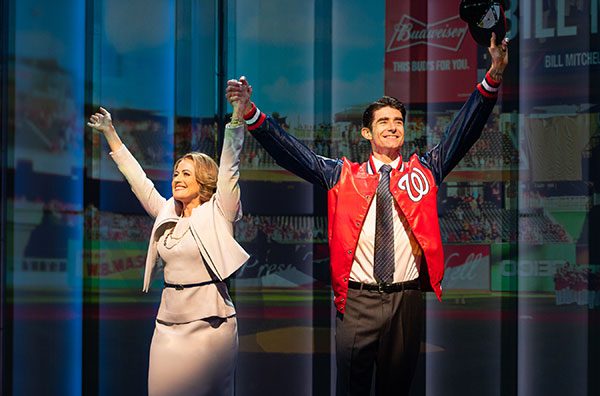Helen Hayes Awards: A Portrait of D.C.’s Theater Community
By • May 16, 2019 0 758

This year’s presentation of the Helen Hayes Awards — the Washington theater community’s celebratory awards show — took place on May 13 at the Anthem in the Wharf development. The 35th annual event produced no playground bullies, no sweeps, no juggernaut or dominating productions.
Rather, it ended up being a large and larger portrait of the D.C. theater community itself, always changed and changing, continually growing, a mix and a mash of size, venues, intentions and ambitions.
This has been especially true over the past five years, when TheatreWashington instituted a critical and fraught change in the awards themselves, after some nagging controversies over categories and the selection of winners. Instead of a Helen Hayes award, the awards were fractured along the lines of Helens and Hayes categories, based on determining the “ratio of Actors’ Equity contracts involved in individual productions.”
The new structure at first resulted in considerable confusion; one result was perhaps one of the longest nights in the history of the awards. Even immediately, however, and over time, the results were by and large salutatory in effect, opening a path to be honored for what were essentially theater companies with smaller resources and size but equal artistry, and gave exposure to the full range of the gifts of the D.C. theater community (which were and are considerable).
On view on awards nights was a familial community that was richly talented, edgy, attuned to and reactive to the terms of the times we live in, stocked with gifted artists, already rich in history, with a national profile and a local communal spirit.
A group of this year’s nominees and honorees might look more like a large tent, forward looking, young and energetic, but tempered by its own traditions and veterans, even accompanied by a bit of music, some of it new and now, but also some of it fresh-faced versions of the standby presence of the American musical, always ready to be reimagined.
No production received more than four awards — the four-award winners were Arena Stage, in the Hayes category, for its energetic staging of “Anything Goes,” and 1st Stage, in the Helen category, for a new musical, “Fly by Night,” a romantic turn set in the time of the New York blackout.
Two other musicals — “Camelot” at Shakespeare Theatre Company (best musical in the Hayes category) and “Chicago” at the Keegan Theatre (Helen category) — won three awards, as did “The Wiz” at Ford’s Theatre.
Hayes or Helen, Helen or Hayes, the honorees gave you a flavor of the landscape of the theater community, just by jumping around:
Brian S. Allard, won as lighting designer for “Titus Andronicus” at the wordless Synetic Theater (Helen), where Irina Tsikurishvili was honored for best choreography for “Sleepy Hollow.”
Woolly Mammoth, which has set the standard for living and performing on the edge for decades, won awards for its production of volatile, combustible playwright Branden Jacobs-Jenkins’s tense “Gloria” (also best production in a play), while “Indecent,” a play by the always pertinent and impertinent playwright Paula Vogel, got a best director’s award for Eric Rosen at Arena.
But there was also the emergence into the spotlight for Solas Nua company, which won a Helen category award for outstanding ensemble in a play for its production of “The Frederick Douglass Project.” And there was the remarkable joint production — Spooky Action Theatre with Georgetown University — of “The Lathe of Heaven,” based on a work by the legendary futuristic novelist Ursula Le Guin — which won a design award.
The wealth spreads in this era: from the extremely gifted Nastacia Diaz for outstanding lead actress in a musical (Hayes), in Signature Theatre’s impassioned production of Sondheim’s “Passion” to DeCarlo Raspberry’s nod for supporting actor in a musical in “The Little Mermaid” at Toby’s Dinner Theatre.
Best actors and actress in a play: Eugene Lee in August Wilson’s “Two Trains Running” at Arena, Erika Rose in “Queens Girl in Africa” at Mosaic Theater.
Tradition prevailed in the category of outstanding theater for young audiences, with Imagination Stage’s “You’re A Good Man, Charlie Brown” proving the title true, as in the best man.
The annual Helen Hayes Tribute, which used to be regularly given to artists with national reputations, is more and more returning to the community roots of Washington theater, as witness the long overdue presentation to Jennifer Nelson, a genuine city and regional theater person of long standing, beginning in 1972, as director, founder of African Continuum Theatre Company.
You get a good sense of the multilayered, multi-hued, multi-themed world of Washington theater just by reading the names of actors and actresses, plays, directors, designers, choreographers — it’s a world both expansive and expanded.
Statistics tell a story, too, which portray a good night’s and good year’s good works: 256 Helen Hayes Award nominees — Helen and Hayes and so forth — with 56 recipients from 208 eligible productions and 2,866 individual pieces of work from 33 theater companies for the year 2018, resulting in the sounds echoing all year of two hands clapping everywhere.

